Twenty-five years ago and for the course of thirty days, the world witnessed magic in the basketball courts of Portland and Barcelona when the gods of the game graced together along a unique experience that most likely we will never be seen again, ever. A collection of eleven NBA players and one college player made up the Dream Team: The Best Team ever assembled
Today’s entry is a tribute to them and to that memorable ocassion. My intention is to share a bit of history and my take on the whole Dream Team subject before, during and after their Olympics venture.
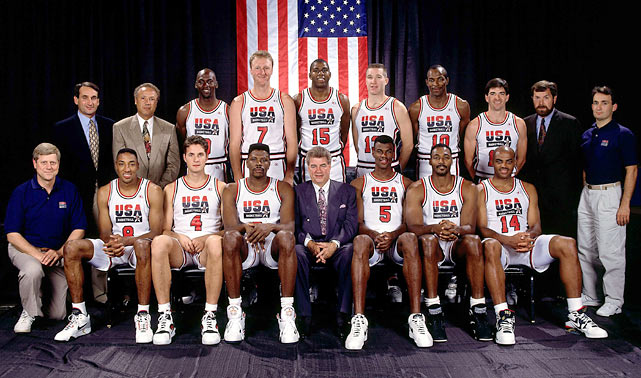
The Best Team ever assembled
It all started in 1988 when the United States went back home from Korea’s Summer Olympics with an embarrassing Bronze Model. The International Basket Federation finally had enough of external pressures on globalizing the sport and gave in allowing professional players to play on international competitions -including the Olympics-. The NBA then, was asked to supply a list of players for the upcoming 1992 Barcelona Olympics. Initially the league was not too much into the idea, but eventually, NBA commisioner David Stern was convinced that the best players had to be selected in order to redeem the image of American Basketball as the world’s elite level nation. By May 1992, the squad was officially complete eleven NBA pros who were near or at their absolute peaks, plus one college player would make the trip to Barcelona in order to show the world who was the superpower of the world when it came to basketball.
Larry Bird
At 35 Larry Bird was the oldest of the team. He was also in his last season and he actually had announced that he would retire after playing in the Olympics. He had been plagued by back problems since the 1988-89 season, which he missed almost entirely, and was the only player that could be argued was way past his peak. Yet, any Larry Bird season past his prime, was still better than any season of any other NBA players. In his last season, 1991-92, he averaged 20.2 points, 9.6 rebounds, 6.8 steals and 0.9 steals. He also shot 47% on field goals, 41% on three-pointers and 93% from the free throw line.
As you can see, to say that Larry Bird did not deserve to be on the team, was as insulting as it could get. I will say though that, when looking at the numbers of that 1991-92 season, you can say it was his worst season by far. This is a man who in 1983-84 posted 24.2 ppg, 10.1 rpg, 6.6 assists, 1.8 steals and shot 49-25-89. In 1984-85, his stats were 28.7 ppg, 10.5 rpg, 6.6 assists, 1.6 steals and shot 52-43-89. In 1986-87, he posted 28.1 ppg, 9.2 rpg, 7.6 assists, 1.8 steals, and shot 53-40-91! So, you pretty much get the picture. Larry retired averaging 24.3 ppg, 10 rpg, 6.3 assists, 1.7 steals, 0.8 blocks, shooting 50-38-89. Simply put: insane numbers.
Larry being picked for the team was a no-brainer, despite everyone (including fans) knowing he would not see too much action because of his back injury. He was selected not only because of his numbers, but because of his legacy and the historic nature of the team. He was a six time NBA finalist, three time NBA Champion, three time MVP, and the best shooter of all time.
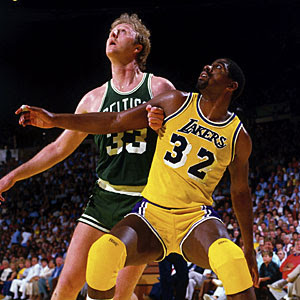
Larry and Magic revived the NBA in the 1980s and paved the way for Isiah, MJ, Barkley and many others
Magic Johnson
Along with Bird, Magic was the other veteran. Magic was still at his peak in 1991 -despite losing to Michael Jordan’s Chicago Bulls in the NBA Finals-, when an unfortunate news broke out for him. He had been diagnosed with HIV, which made him take the decision of retiring from the game. In that 1990-91 season, Magic averaged 19.4 ppg, 12.5 assists, 7 rebounds, 1.3 steals, and shot 48-32-91. He didn’t play in 1991-92 and almost everyone expected him to die of AIDS. He was still healthy and able and willing to compete and play, so he was chosen to serve as co-captain of the team alongside his rival and friend Larry Bird.
Like in Bird’s case, to claim that Magic was past his prime is ridiculous. Magic and Bird had always been in their primes, from the day they first set foot on the NBA, until their very last game. To pick Magic’s best season is an almost impossibe task, because Magic’s contribution to the game was beyond posting 20 ppg and 12 assists along with 8 rebounds and 1.8 steals per game. In Magic you had arguably the second best NBA player of all time. You had a player who could play any position comfortably. You had a player who was dangerous in offense and in defense in any position. You had a player who was the leader of the team. You had a player who was charismatic and who brought the positive momentum to your team.
Magic being picked cemented the historic nature of the Dream Team. With the second best player of all time, and the absolute best clutch shotmaker of all time, the only remaining element the team needed now, was the man that was positiong himself to become the absolute best player of all time.
Michael Jordan
Let me be crystal clear: in 1992, Michael Jordan was not the best NBA player of all time, yet. He was the best player of the league, and that was it. But before 1992, Jordan was first seen as the superlative talent who could score at will 35 points per game, who nobody could stop and who could play defense better than any one had ever played before. However, he had hit a brick wall against the Detroit Pistons, led by Isiah Thomas, who knew exactly what Jordan’s weakness was, which was, being selfish and not trusting his teammates.
Three times the Pistons beat Jordan’s Bulls and taught him important valuable lessons on what exactly was needed to become a winner in the NBA. The fourth time Jordan faced the Pistons, he was a more mature player and a more mature person. He took his 35 points per game signature and his skills with the ball, and took his game to a whole new level. A more cooperative Jordan, learned that basketball was a team game, and that despite him being the leader and absolute best individual player of the league, sometimes his teammates could also share some of his glory. In 1990-91, he swept the Pistons and went on to win his first NBA Championship, defeating Magic Johnson’s Lakers in five games. The following season, he would reach the finals once again and defeat the Clyde Drexler’s led Portland Trail Blazers.
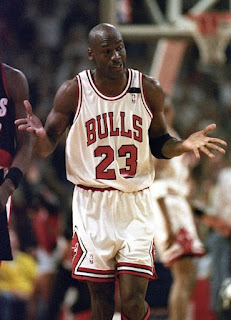
Jordan gesturing after his famous six straight
3-pointer shooting vs Portland in the 1992 Finals
With two rings in his fingers, Jordan had tied Isiah Thomas, the other great player who had dominated the 80s, but was still behind Bird’s three, Magic’s five and Kareem’s six. Still, it was a no brainer to pick the best player in the league. The point that I’m trying to make is that just like I did with Bird and Magic, you have to put things in perspective when talking about the Dream Team, and Jordan’s case. In 1992, he wasn’t the best NBA player of all time. He was on his way, yes, but he wasn’t there yet.
Karl Malone and John Stockton
Like with Bird, Johnson and Jordan, it’s an understate ment to say that the pick and rollers were at their absolute peak when chosen for the dream team in 1992. With Magic retired and Isiah Thomas recovering from injuries sustained in the 1990-91 season, John Stockton had established himself as the best point guard in the NBA, averaging 14.5, 14.3 and 13.7 assists in the three seasons preceding the Olympics.
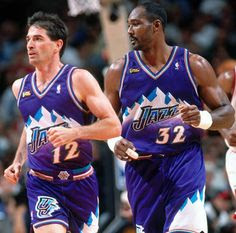
Karl Malone was arguably one of the two best power forwards of the time -the other one being Charles Barkley-, and had been posting insane numbers such as averaging 28 ppg, 11.8 rebounds and 3.8 assists, while shooting over 55% from the field in 1991-92. Many cronists argue that to pick one you had to pick the other, but in all honestly, both John and Karl were picked because of both their on-court chemistry and also by their individual achievements.
Charles Barkley
One of the biggest debates of the 1990s was, who was the best power forward: Malone or Barkley? Pick your choice, but I would chose Barkley any day. While their numbers were pretty similar -Barkley doing 27.6 ppg, 12.2 rpg, 5.1 assists, shooting 55% from the field-, Sir Charles had always struck me as more of a leader and a hustler. Also, Charles was a better 2P shooter, averaging 63%, way above Malone’s 52%. The good news for the Dream Team is that there wasn’t any need to pick one of the two and leave the other one behind.
By 1992 Charles had been playing for eight seasons with the 76ers and was seen as one of the best players in the NBA without a ring. A lot of people -including myself- believed that if anyone could be able to stop Michael Jordan in the NBA Finals, it would be Charles. He was also the only true physical player chosen. No one else would even dare to hustle the way Charles did; not that it would be needed anyway, but still it was good to at least have the option there, had the ocassion presented itself.

Always a controversial figure, Barkley would become the Dream Team’s best ambassador and public speaker
In a nutshell, Barkley was a combination of many great players who would definitely not be chosen for the team. He had Dennis Rodman’s aggresive rebounder nature, Dominique Wilkins showmanship on offense, Kevin McHale’s defense and James Worthy’s effectiveness. Put all those talents in a blender, and add some extra something special, and you have Sir Charles Barkley.
Chris Mullin and Scottie Pippen
Before Reggie Miller and Ray Allen became the best shooters in the NBA, there was Chris Mullin. Chris was a quiet player, who led his numbers do the talking for him. He averaged three-pointing shooting of 37%, 32%, 37% and 45% in the seasons preceding the 1992 Olympics, along with 25 points per game, 5.9 rebounds and 2.1 steals, meaning not only he was a great shooter, but also a great defender. He also averaged over 54% from the field. In all honestly, only Barkley was able to top Chris’ shooting abilities.
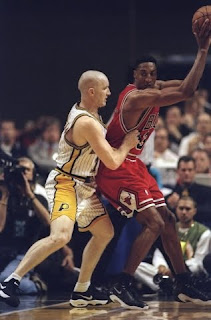
Then we have Scottie, who in my opinion was chosen more because of his defensive skills than because of his offense. Scottie was at the time the most dangerous player in the defensive line of the entire NBA. He was also Jordan’s sidekick and to have MJ on the team without Scottie, would have been wrong. There has been a lot of controversy regarding Scottie and Isiah Thomas’ selection, with the former claiming he did not want Isiah on the team, and the latter claiming that Scottie had no right to say anything about Isiah’s selection on the team. Some fans even argue that Scottie should have been dropped in favor of Isiah. I myself being a Pistons fan, have to swallow my pride and admit that Scottie deserved to be in the team, and that Isiah not being chosen had nothing to do with him. I’ll get to that in a few parapraphs below.
David Robinson and Patrick Ewing
Another no brainer. David and Pat were the #3 and #2 best centers of the NBA in 1992 -the #1 being Hakeem Olajuwon-. Like it happened with Barkley and Malone, David and Pat’s numbers were both pretty similar and pretty insane. Also, they were the pillars and leaders of their respective teams, the San Antonio Spurs and the New York Knicks. Both of them averaged around 25 points per game, 12 rebounds, 3 blocks, and were as physically intimidating as you can get. Hakeem’s game was a level above theirs, but fortunately there was no need to worry about him.
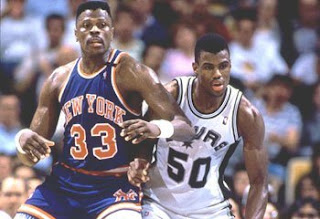
The Final Choice: Clyde Drexler vs Isiah Thomas. And… Chris Laettner (doh…)
By 1992, the NBA history was like this: with the exception of one season, every single NBA Championship since 1980, had been won by Magic Johnson, or Larry Bird, or Isiah Thomas or Michael Jordan. Magic, Larry and Michael had been picked for the team, therefore it would only make so much sense to pick Isiah Thomas, who was arguably the second best point guard of all time, behind Magic Johnson.
The NBA decided they would pick a college player as a nod to the previous selection system, so that meant that there would only be one spot left for an NBA pro, and it was either Clyde The Glide or Zeke. In the end Clyde was chosen over Isiah, in a decision that has generated controvery for years and will likely continue to do so until the end of time. My opinion on the case, is that Clyde deserved to be on the team. Clyde was arguably the second best shooting gard of the league next to MJ, with his talents spanning on both ends of the court. His numbers prove it just like they do with the other chosen players: 25 ppg, 6.6 rebounds, 6.7 assists, 1.8 steals, shooting 48-38-80. What were Zeke’s numbers by 1992? 19.2 ppg, 9.3 assists, 2 steals. Like I said, second best after Magic. At the time, fans complained that Zeke was dropped in favor of Clyde, but years later the truth went out and it was discovered that it was Michael, Magic and Larry -along with Karl, Chris and Scottie- who didn’t want Isiah on the team, due to his aggressive competitive nature shown in the many years he spent competing against them, that involved brawls, fights, broken noses and a team walk-off the court when facing defeat against MJ in the 1991 Conference Finals. Anyway, back to the Clyde issue against Isiah.

Thomas had also beat Drexler in the
1991 NBA Finals
In my opinion, the problem wasn’t Clyde being chosen over Isiah, it was Chris Laettner being picked over Isiah. Honestly, Laettner had no business to do on the Dream Team, other than to carry their bags and serve as their ring bearer. The nod to the “old college system” kind of back fired, because Laettner ended up turning into a big nothing in the NBA, whereas it was Shaquille O’Neal -the #2 college player who was considered along with Laettner- the one who really became the legend he was destined to be.
Because of the historic nature of the team and because who Isiah Thomas was and what he meant to the game, he should have been chosen over Laettner. I honestly have nothing against any of the other choices, and I believe there wasn’t a single choice that should have been dropped in favor of another player. The Dream Team should have featured zero college players and that was it, because of the simple reasoning that never again you would be able to gather a collection of such elite legendary players such as the ones that would represent the United States in the 1992 Olympics in Barcelona.
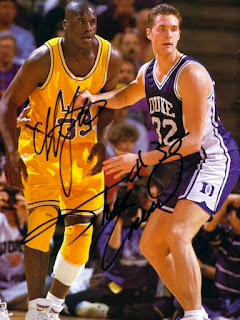
Shaq and Laettner in their
college years
Regarding the controversy of picking Laettner of Shaq, I don’t make a big fuzz about it. In 1992, Chris was the most accomplished NCAA player and that was it. Sure you could make a case that some people saw and believed that Shaq was going to be a huge thing, but there wasn’t any insurance on that. I mean, how many times have you seen or heard of someone who is going to become the next big thing, and doesn’t. It was impossible to know where Shaq was headed. Yes, there were many hints, but objectively speaking by 1992, Laettner was more accomplished and had been successful than Shaq.
Final thoughts
The Dream Team went on to win all their matches -as expected- with a 44 point average difference over their rivals. There was no way to stop them or to even pose a threat to them. One thing most people don’t talk about, is how despite this outstanding success and pounding of the rest of the teams that faced them, is the fact that in my opinion the Dream Team never played at 100%.
Even the Gold Medal Match vs Croatia, was played at I would say 70%, or maybe 80% max of their strength. They were so honorable and so respectful that they considered it wasn’t even necessary to show the world their full power, which I believe had they done, they would have averaged a point difference of 60 points over their oppponents, including Croatia.
The 1992 Dream Team mission was successfully accomplished: to show the world that the United States was the superpower in basketball and that even in victory you can be graceful and a true ambassador of what sports is supposed to be: a fun competition that should always be a spectacle to enjoy, for the players and for the fans.
HR
